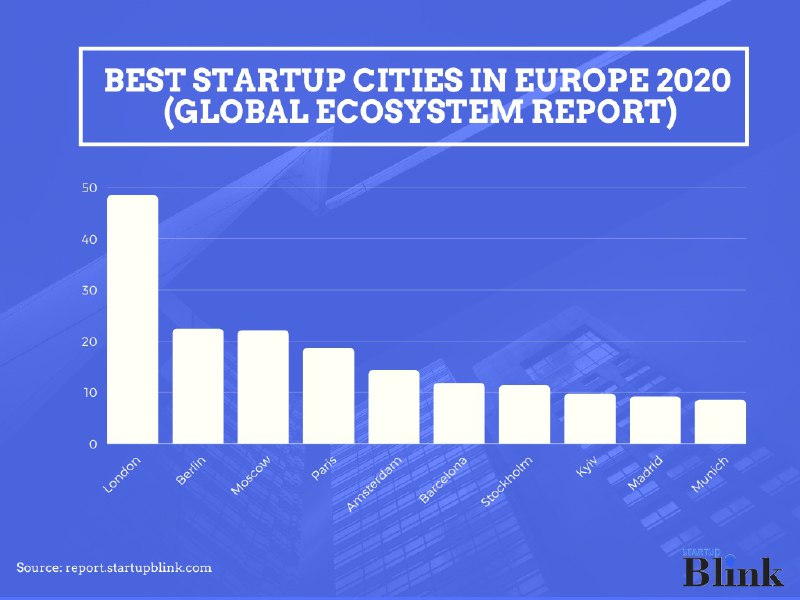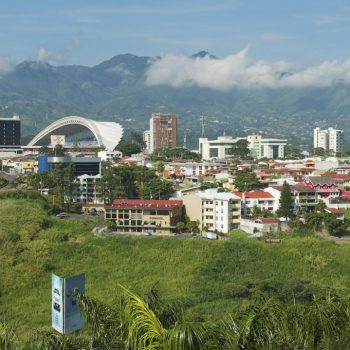The European startup ecosystem is a complex and diverse network that encompasses almost 50 countries and sovereign states in a geographical area of 10 million square kilometers, making it one of the smallest continents.
Startup Blink has compiled and analyzed data from 45 countries, with 339 European startup ecosystems present in our latest Top 1000 rankings. This includes all 27 member states of the European Union as well as countries that are only partially located in Europe such as Russia and Georgia.
This article will discuss the key features of the European startup ecosystem and present an overview of the countries and cities that consistently rank at the top.
Are you interested in startup innovation and entrepreneurship? You can access more reports on global and regional economic development as well as our new Coronavirus Innovation Map that shows the best countries fighting the pandemic and facilitating new developments in the pandemic era.
The European Startup Ecosystem
Europe has many thriving ecosystems, whether national or concentrated in certain areas, each one with its own focus and notable for different reasons.
In recent years, there hasn’t been a lot of variations in the regions best and top performing startup ecosystems. The United Kingdom, Germany, Switzerland, the Netherlands, Spain, and Sweden are the six prominent countries leading in the Top 10 of Global Startup Ecosystems.
United Kingdom
The dynamic force of the UK startup ecosystem is primarily attributed to London, which has retained its position in the global Top 10 in the last couple of years.
Following Brexit, there is no indication of this changing, with no other European ecosystem capable of absorbing the strength of the British ecosystem. London also continues to be the epicenter of the European VC, with a mature system of support and promising young entrepreneurs and access to government support.
After London, the UK has two more cities ranked in the Top 100 globally and another seven in the Top 500 rankings of 2020, demonstrating the unique position of London to add weight to UK’s startup ecosystem.
Germany
Germany is well-positioned to become the next big entrepreneurial hub and startup ecosystem in the European Union, following Brexit. Compared to most major European cities, Germany still offers affordable living options and has managed to attract a strong pool of international talent, both on the business and creative front. Coupled with strong government support and interest in startup innovation and entrepreneurship, and its relationship to international investment groups, Germany boasts four cities in the Global Top 100 and six more in the Global Top 500.
Best Startup Cities in Europe
The leading European startup cities are relatively stable, with few discrepancies from year to year. The startup hubs of London, Berlin, Moscow, Barcelona, Stockholm, Amsterdam, and Paris occupy top spots in the global rankings
London
One of the most mature ecosystems in Europe, with startups in the sectors of software, e-commerce, fintech, and banking, and good connections to the North American markets. The high salaries and cost of living make the London ecosystem a fiercely competitive place to operate from and affordable incubators and co-working spaces might be harder to come by.
Moscow
The only Russian city to continuously rank high in the European ecosystem as well as globally, Moscow has lots of government support and is focused on retaining and scaling through access to a vast domestic market. The geopolitical situation is one of the biggest limitations of the Moscow startup ecosystem, that faces financial and travel restrictions when considering international expansion.
Amsterdam
One of the most active startup hubs in Europe, Amsterdam has a vibrant community of young entrepreneurs with some of the highest numbers of female founders in the EU, and a range of sectors covering traditional and new industries like Green-tech. The only city in the Netherlands to be ranked in the Top 100 globally, Amsterdam is one of the smallest startup ecosystems population-wise to be ranked in the Top 10.
Paris
Paris is the strongest and most notable hub of France, with a stable presence in the top rankings globally and a relatively supportive government infrastructure and entrepreneurship mindset that has been growing in popularity.
Top 10 Cities in Europe

Strengths and Limitations of the European Startup Ecosystem
At first glance, the European ecosystem shows healthy movement, with lots of the European countries continuing to hold top positions in the rankings. There is, however, a discrepancy between the potential of the startup ecosystem and its overall performance when compared to other regions.
In comparison to the USA, the leading hubs of Europe are much fewer in size, concentration, capital, and talent. This slow growth and apprehension towards reforms has proven detrimental to Europe’s success and ability to overtake or compete with the startup ecosystem of cities in the United States. The early-stage entrepreneurial activity in Europe is also lower in the adult population, compared to other regions, especially in Italy, Poland, Greece, and Slovenia. There are many factors for the discrepancy between potential and growth in the European startup ecosystem guide and we will briefly touch on a few of them here.
Strengths
Establishment
The European startup ecosystem is well established and attractive to a diverse set of investors, as long as it can leverage its position and retain its talent pool. This requires a shift in the cultural mindset that values successful exits in certain areas more, like France, or has become a media-hyped trend that does not always translate to successful enterprises.
B2B
Close ties and working relationships between the different players of the European ecosystem are a critical component to fostering innovation and growth, especially when government relationships can facilitate further connections. The strength of B2B European startups and the recent embrace of a digital economy will become even more important during the coronavirus era.
Growth of tech funding
The European startup ecosystem has also witnessed tremendous gains in tech funding, with a massive increase of 500% between 2012 and 2017 totalling 25 billion. The upward trend carried on until the second quarter of 2019 and has since dropped to levels similar to those in 2018, likely influenced by the pandemic. London in particular has remained a strong fintech hub, with a promising outlook for the future of technological developments in the region.
E-visas and residency programs
Several European countries have started to offer e-visas for entrepreneurs and flexible residency permits to attract entrepreneurs. This comes in addition to flexible government regulations to support the growth of emerging startups. Estonia is one of the leaders in nomad and e-residency visas, with lots of other European countries trialing similar approaches and paving a new digital era.
English fluency
Overall, Europe has one of the highest levels of English proficiency compared to all other regions, with the EU and Schengen Area countries outperforming the rest. There is, however, a notable generation and gender gap, with women doing better than men. While English fluency isn’t a defining factor in startup ecosystem support, moderate to high proficiency makes it easier to attract talent from overseas, and international investors.
Limitations
No big industry giants
One of the areas where the European startup ecosystem hasn’t managed to shine is the creation of startup giants, in the likes of Google, Amazon, Facebook, and Microsoft. No company has come close to the scale and authority of startups coming out of the USA, which is a failure when taking into consideration the amount of talent and the size of the economy.
Late to the game
Europe is relatively late to the game of startups and the first venture capital firms were not established until the mid 1990s, in contrast to the USA that had significant movement since the 1940s. While not a defining factor on its own, the slow pace has not benefited the European ecosystem.
Lack of government support
Possibly the biggest obstacle to explosive growth, the barriers imposed by government regulations on the European ecosystem have created a slow, and timid approach. The bureaucratic red tape present in many European ecosystems, most notably Greece, France, and Italy, create a rigid job market where firing and hiring employees becomes troublesome, and over-taxation makes flexible employment disadvantageous in the long run, forcing most individuals to rely on subsidies from the government.
One area where the limitations of the European ecosystem becomes evident is the comparison between EU and non-EU members. Countries like Switzerland and Norway and now the UK have long withstanding high business scores and stable markets but have chosen to remain outside the control and regulations imposed by the EU. This is a clear sign that some of the agreements may not be allowing the region to fulfill its potential. While some regulations have been celebrated as opportunities, like the introduction of PSD2 Open Banking, there is still much that can be done to break down borders and allow communication between the local ecosystems.
Resources on Events and Activities in the European Ecosystem
There are multiple projects, events and activities focused on the European ecosystem both as a whole and according to each region.
Startup Europe – A project of the European Commission that aims to bring together the key players of various startup ecosystems in the region.
Startup Europe Week – A movement that focuses on local stories and access to resources to help budding entrepreneurs. More than 300 cities in 50 countries.
European Maker Week – Initiative by the European Commission that promotes the importance of entrepreneurship and business mindset within education and schools in Europe
Erasmus for Young Entrepreneurs – Another initiative partly financed by the European Commission for eligible EU residents where young or aspiring entrepreneurs are teamed up with experienced members for mentoring, collaboration and exchange of ideas.
EU Prizes – Multiple prizes are available for individuals with innovative solutions like SOFT Innovation Prize for researchers and EU Prize for Women Innovators.
European Innovation Calendar – A resource for those looking to stay up to date with events and workshops happening in Europe. (*Due to the pandemic most events have been reschedule or moved online)
Startup Blink – The global map of startups developed by Startup Blink is the most comprehensive tool into the startup feature of your local or regional ecosystem. You can access resources on startups, accelerators, leaders, organizations and coworking spaces in your area and get a deeper insight into your ecosystem.
Startup Blink Meetups and Webinars– A global community of innovators and startup enthusiasts. Find us on Meetup and join one of our dozens events across the world each month. Sign up for our pitching events and get the chance to pitch and connect with other local entrepreneurs each month.
Summing Up
The startup ecosystem in Europe continues to be present in the top ranks globally, but is not yet in a position to compete with the more aggressive, and free market dynamics of the US startup ecosystem. The UK’s exit from the European Union has not changed its prominent position and remains stable, with Berlin, Amsterdam, Moscow, Paris and Stockholm as long standing and powerful startup hubs in the region. The limitations of the ecosystem are primarily based around government support, excessive regulation and government taxation, but the cultural mindset towards entrepreneurship has also been an issue, historically, which is slowly but steadily changing.







People reacted to this story.
Show comments Hide comments[…] Read More: Startup Ecosystem Guide Europe […]
Comments are closed.